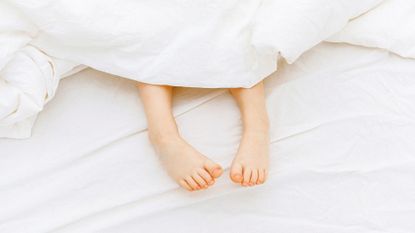
Our best sheets guide includes sheets in a range of fabrics, from cotton to linen to synthetic to bamboo. So which one should you go for? This article is here explain the differences between the different sheet fabric options and help you pick the right one for your needs.
Investing in some quality sheets can make a major difference to your sleep quality – perhaps not quite as much as finding the best mattress and best pillow, but still significant. Bedding that feels good on your skin, washes well and provides good breathability can make for a much, much comfier night's sleep. Read on for a closer look at the most common types of sheets are, and what you need to know to pick the right one for you.
- Browse our predictions for the best Black Friday mattress deals
- You might also want to check out the best bath towels around
Should I buy cotton sheets?
Cotton is made from fibres taken from the cotton plant, which are then spun into yarn or thread. Its feel is soft and luxurious, and as a completely natural material, it’s hypoallergenic, making it a good choice for anyone with sensitive skin. It’s also breathable and very durable.
The quality of cotton has long been measured in thread counts, and it’s generally believed that the higher the thread count, the better. But that’s not necessarily true.
Firstly, manufacturers have been known to use “creative accounting” to artificially enlarge the number of threads counted. And secondly, the higher the number of threads, the tighter the weave, which can reduce airflow and attract moisture. For this reason, a high thread count can be bad for people who run hot at night. Our advice is to look for a thread count between 200 and 400 as a starting point, then adjust to suit what’s best for you.
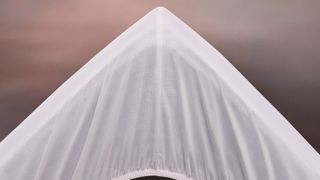
The gold standard in cotton sheets are considered to be those made from Egyptian cotton. The cotton strands these plants produce are longer and so give a softer, more luxurious feel. Note that 'Egyptian' refers to the type of plant that the cotton comes from rather than the country. So you can theoretically have Egyptian cotton that doesn’t come from Egypt, and cotton from Egypt that isn’t Egyptian cotton (much like you can have 'American Cheddar').
If your budget can’t stretch to Egyptian cotton, then take a look at Supima, which is another premium, soft cotton that’s gaining popularity.
Sign up to the T3 newsletter for smarter living straight to your inbox
Get all the latest news, reviews, deals and buying guides on gorgeous tech, home and active products from the T3 experts
The bad news is, however, that whatever type of cotton you choose, it's not great for the environment. That’s primarily because the plant is notorious for requiring a lot of water to farm. According to the WWF it takes 20,000 litres of water to produce 1kg of cotton: enough to make a single pair of jeans and a T-shirt.
Verdict: Soft and luxurious, cotton has much to recommend it from a practical point of view... but your environmental conscience may keep you awake at night.
Should I buy linen sheets?
Linen sheets are seeing a huge resurgence in popularity, with their crinkly, rustic appearance very much back in fashion. Looks aside, linen is durable and requires very little maintenance (it dries quickly and doesn't even require ironing.) It’s also much more environmentally sustainable than cotton.
Linen is made from the fibres of the flax plant, which has a low carbon footprint because all of its parts can be used. Plus it has a growing cycle of just 100 days, so requires little irrigation or fertilizer.
That said, in practice, just one per cent of the world’s linen is actually organic. So if you want to be responsible, look for linen that’s certified organic, or at least certified chemical-free with a kitemark such as OEKO-TEX, MADE SAFE or GOTS (Global Organic Textile Standard).
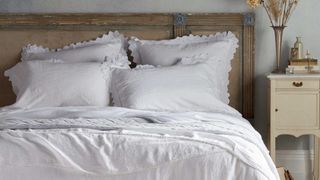
Linen can, initially, feel quite coarse. It actually gets softer and therefore more comfortable over time. The more you wash it, the softer it becomes.
Linen is also naturally breathable, durable and hypoallergenic. It’s especially cool in hot weather due to its moisture absorbancy and lighter weave. Plus it’s widely held to be about 30 per cent more durable than cotton.
Thread counts don't really apply to linen, because the unique structure of the fibres makes it irregular. Some producers instead list the weight as a sign of quality: 200g/m2 is a good place to start.
Verdict: Linen is comfortable, hypoallergenic, hard wearing and great in hot weather. Its environmental credentials are potentially high, too, depending on how it was farmed: organic linen is best.
Should I buy bamboo sheets?
Bamboo is the new kid on the block and is rapidly gaining favour as the go-to fibre for all kinds of sleep-related products, from pillows to duvets to mattress toppers, and more. Fibres are made by reconstructing bamboo into one of three more familiar types of material: Bamboo Rayon, Bamboo Lyocell and Bamboo Linen.
Bamboo grows very quickly, so one area can yield 10 times the equivalent amount of bamboo compared to cotton. Plus not only does it use far less water, the water it does use can be recycled. Depending on the type of bamboo, it also uses fewer chemicals to process and requires far fewer pesticides to grow.
Consequently, it has a much smaller carbon footprint than most materials. That said, the chemicals use to refine bamboo fibre means it’s not 100 per cent environmentally friendly.
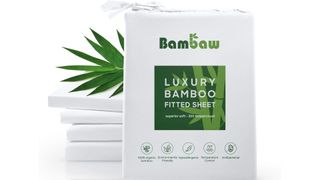
Bamboo fabric is a silky-soft and very breathable fabric. It’s naturally water resistant, and wicks moisture away, making it perfect for sweaty nights. It’s also antimicrobial and hypoallergenic. Be aware, though, that bamboo needs to be treated gently: use a non-biological detergent on a 30 degree wash, and iron on a cool setting.
Verdict: Bamboo is the material of the future, and the most environmentally responsible choice when it comes to sheets right now. It's also silky-soft and luxurious. Just check the label, as product with "bamboo" in their name are often just a mixture of bamboo and low-grade fibres.
Should I buy percale or sateen sheets?
When shopping you may well see ‘percale’ offered as an option when it comes to sheets. But don’t be fooled: percale isn't a material, it’s how the material is weaved. Think of a basket: ‘over-under-over-under’. That is percale, and it typically has a matte finish.
Similarly, sateen is also a type of weave, primarily used in Bamboo and Cotton. It is a ‘four over, one under weave’ and this creates a silky, shinier and smoother effect than percale. It’s basically the closest you can get to satin, at an affordable price.
Of the two, percale is a tighter weave, and so percale sheets can be expected to last longer than sateen. However, both percale and sateen sheets are higher quality and more comfortable than normal sheets.
Tom May is a freelance writer and author of the book, Great Ted Talks: Creativity. He has been editor of Professional Photography magazine, associate editor at Creative Bloq, and deputy editor at net magazine. He has also worked for a wide range of mainstream titles including Radio Times, NME, Heat, Company and Bella.
-
 Can I have my own Amazon locker at home?
Can I have my own Amazon locker at home?Not satisfied with the current delivery model, Jon Bentley has a few ideas for how he wants his parcels securely dropped off
By Jon Bentley Published
-
 Strength training vs. bodybuilding: What’s the difference and what’s best for you?
Strength training vs. bodybuilding: What’s the difference and what’s best for you?Here’s everything you need to know about building muscle and improving strength
By Leon Poultney Published
-
 This pillow flip sleep hack can help you beat Christmas insomnia – and it takes seconds
This pillow flip sleep hack can help you beat Christmas insomnia – and it takes secondsIf you love the cold side of the pillow, you’ll love this quick sleep hack
By Bethan Girdler-Maslen Published
-
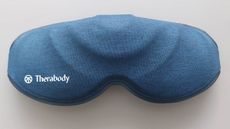 Therabody SleepMask review: soothing vibrations that send you to sleep
Therabody SleepMask review: soothing vibrations that send you to sleepTherabody’s new SleepMask promises a good night’s sleep – but does it work?
By Bethan Girdler-Maslen Published
-
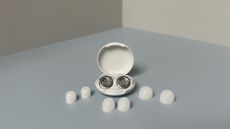 I spent 24 hours with the new Loop Switch 2 earplugs – here's my honest take
I spent 24 hours with the new Loop Switch 2 earplugs – here's my honest takeFrom fun to focus to calm...I tried them in every scenario
By Lizzie Wilmot Published
-
 Sleep expert reveals why you should never nap for longer than 10 minutes
Sleep expert reveals why you should never nap for longer than 10 minutesThe answer will shock you
By Lizzie Wilmot Published
-
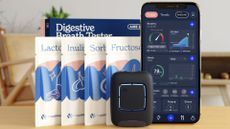 FoodMarble unveils breath analysis programme to enhance digestive health
FoodMarble unveils breath analysis programme to enhance digestive healthIt follows a series of successful product launches
By Lizzie Wilmot Published
-
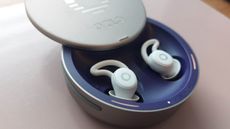 Ozlo Sleepbuds review: exciting work in progress sleep earbuds
Ozlo Sleepbuds review: exciting work in progress sleep earbudsHave the brains behind Bose perfected sleep headphones?
By Bethan Girdler-Maslen Published
-
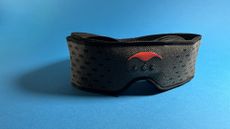 Manta SOUND Sleep Mask review: this game-changing mask for side sleepers is my favourite gadget of 2024
Manta SOUND Sleep Mask review: this game-changing mask for side sleepers is my favourite gadget of 2024Enjoy soothing sounds, total blackout, and long-lasting battery life in one very comfy package
By Joanna Ebsworth Published
-
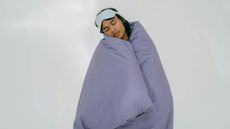 I tried a cocooning compression experience and it’s the most relaxed I’ve ever felt
I tried a cocooning compression experience and it’s the most relaxed I’ve ever feltCocooning might be my new obsession – here’s what it is and what it’s like
By Bethan Girdler-Maslen Published
